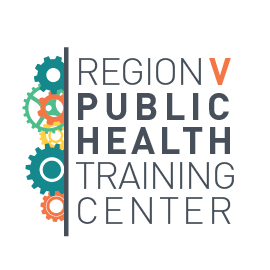Student Eligibility and Requirements
Applications are now closed.
The Region V Community of Practice (RVCoP) is a virtual peer-to-peer learning opportunity for students completing a project with the RVPHTC. Participation in this programming is in addition to the work students do with their project sites.
Through regular webinar sessions and interactive discussions, students will learn how to:
- Apply professional development skills and techniques in an agency setting
- Develop a public health network of professional peers
- Demonstrate the ability to connect public health theories to field practice
Student Responsibilities:
- Orientation: Attend the live Orientation webinar session.
- Surveys*: Complete four program evaluations: baseline, mid-point, post, and 1-year follow up.
- Professional Development: Participate in and complete the evaluation for at least two out of three professional development webinar sessions.
- Networking: Attend at least one out of two virtual coffee chats.
- Complete a Deliverable*: Submit a deliverable (paper or poster).
To receive a “Certificate of Completion,” students must complete the five (5) key pieces of the program, outlined above. Activities required to receive the student stipend are denoted with a *.
Hours:
- 100 for undergraduate students
- 150 for graduate students
Student Eligibility: Additional Details
- Full- or part-time students that come from any academic institution in the region
- Graduate, doctoral, and undergraduate (junior/senior) students pursuing a degree in a health profession (public health, social work, psychology, or sociology)
- Tribal Community College students enrolled in a health professions degree program (e.g., allied health, community health worker) are eligible
- U.S. citizens, non-citizen U.S. nationals, or foreign nationals holding a visa permitting permanent residence in the United States. Note: DACA recipients and international students with work/research/student visas are not eligible for this particular federal funding.
- The same student cannot receive a stipend for more than one project.
I [learned] a lot about program evaluation, supervision, professional boundaries, discipline in working from home, and being flexible in working through COVID-19.
Working with the Saginaw County Health Department I was provided the opportunity to work with many public health professionals and stakeholders in [the] County. My experience has expanded my professional network and improved my analytical, data interpretation, and interpersonal communication skills. I will certainly be able to take what I learned throughout my field placement and apply it to my future career.
It was the most influential role I’ve ever had in a project by initiating the literature review, performing the data analysis, and selecting the areas where I think MDH could have an impact. My input was valued and I, in turn, learned a great deal from my colleagues.
